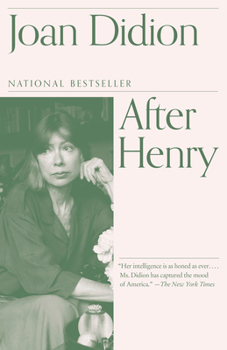After Henry
Select Format
Select Condition 
Book Overview
NATIONAL BESTSELLER - Didion's "reportorial pieces afford the pleasures of literature.... She is an expert geographer of the landscape of American public culture" (The New York Times Book Review).
Here, the National Book Award-winning author of The Year of Magical Thinking covers ground from Washington to Los Angeles, from a TV producer's gargantuan "manor" to the racial battlefields of New York's criminal courts. At each stop she uncovers the mythic narratives that elude other observers: Didion tells us about the fantasies the media construct around crime victims and presidential candidates; she gives us new interpretations of the stories of Nancy Reagan and Patty Hearst; she charts America's rollercoaster ride through evanescent booms and hard times that won't go away. A bracing amalgam of skepticism and sympathy, After Henry is further proof of Joan Didion's infallible radar for the true spirit of our age.Format:Paperback
Language:English
ISBN:0679745394
ISBN13:9780679745396
Release Date:April 1993
Publisher:Vintage
Length:320 Pages
Weight:0.69 lbs.
Dimensions:0.8" x 5.1" x 7.9"
Customer Reviews
2 ratings
The story behind the story
Published by Thriftbooks.com User , 18 years ago
It's interesting to read Joan Didion in some sort of rough chronological sequence, because I'm watching her mind and her writing develop as I go. Her earlier books, Slouching Towards Bethlehem and The White Album, are intensely personal affairs that use her own experiences to illustrate general features of 1960's America. They are brilliant pieces of work that have encouraged me to read everything else she's written, but they are also profoundly self-absorbed. Reading her earliest works, I feel like a therapist talking to someone who is stuck inside her own head; every time she tries to solve a problem, she finds some reason why she can't, and the chain of reasons ultimately leads in a circle back to her initial desperation. It's a good thing Prozac didn't exist then (only gin and hot water, and Dexedrine), or else we'd never have gotten works of such political and literary brilliance. What's fascinating about those earlier books, and about After Henry (the most recent book of hers that I've read), is that there's at least one strong narrative line through all of them: they are books about the stories in which Americans enshroud the news. The White Album's title essay is famous for its opening line: "We tell ourselves stories in order to live." That's what appears in Bartlett's from The White Album, but it's basically vacuous without the rest of the paragraph -- a paragraph that summarizes, at an abstract level, every essay that she's written since (at least among the ones I've read): "We tell ourselves stories in order to live. The princess is caged in the consulate. The man with the candy will lead the children into the sea. The naked woman on the ledge outside the window on the sixteenth floor is a victim of accidie, or the naked woman is an exhibitionist, and it would be "interesting" to know which. We tell ourselves that it makes some difference whether the naked woman is about to commit a mortal sin or is about to register a political protest or is about to be, the Aristophanic view, snatched back to the human condition by the fireman in priest's clothing just visible in the window behind her, the one smiling at the telephoto lens. We look for the sermon in the suicide, for the social or moral lesson in the murder of five. We interpret what we see, select the most workable of the multiple choices. We live entirely, especially if we are writers, by the imposition of a narrative line upon disparate images, by the "ideas" with which we have learned to freeze the shifting phantasmagoria which is our actual experience. "Or at least we do for a while. I am talking here about a time when I began to doubt the premises of all the stories I had ever told myself, a common condition but one I found troubling. ..." The White Album and Slouching Towards Bethlehem continue on this theme, at very concrete levels. Didion is our Virgil, giving us the slideshow tour of Hell and only rarely drawing out a lesson. The world doesn't make sense anymore; the ce
Sentimental
Published by Thriftbooks.com User , 28 years ago
Joan Didion is one of America's most gifted writers, and "After Henry" is no exception. Though at times her prose is lax, it is mostly pure and simple. "After Henry" is the perfect book of thoughts, essays for a rainy, Sunday afternoon. It is one of Didion's most heartfelt triumphs. Good






